Key takeaways:
- Ocean conservation is vital for the health of our planet, affecting oxygen production, food supply, and climate regulation.
- Motivating others to adopt sustainable practices creates a ripple effect, fostering community engagement and collective action.
- Sharing personal experiences and storytelling is effective in inspiring others to embrace conservation efforts and sustainable living.
- Organizing community events and utilizing social media can significantly enhance awareness and participation in ocean conservation initiatives.
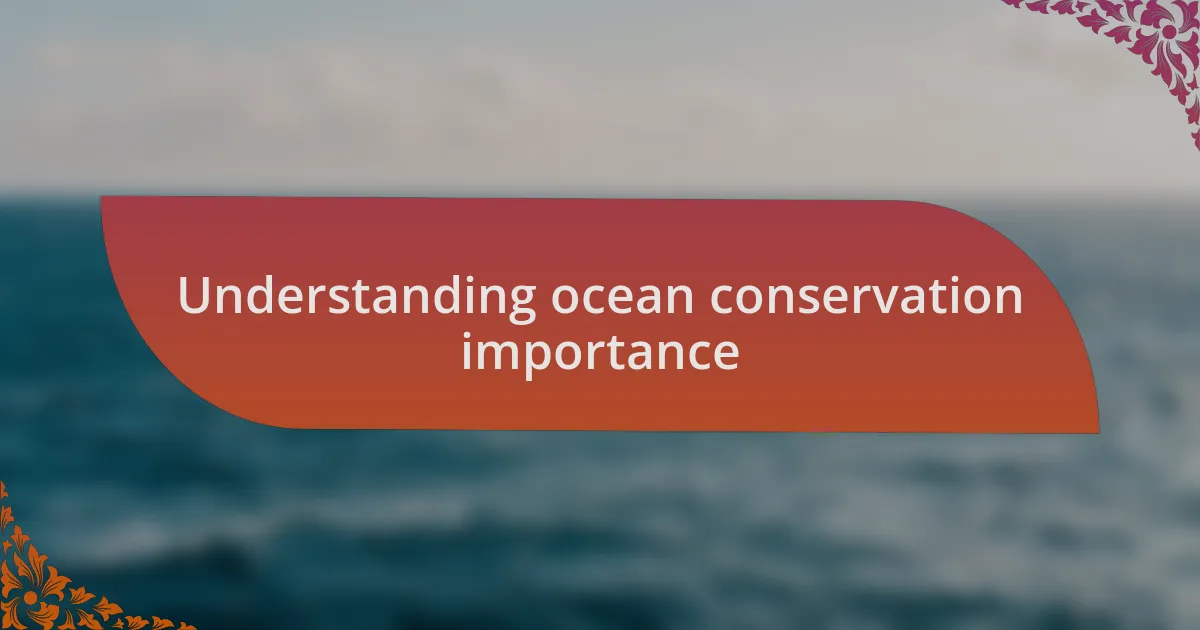
Understanding ocean conservation importance
Ocean conservation is crucial because our oceans are the lifeblood of our planet, providing not only oxygen but also food and climate regulation. I remember standing on the beach and watching turtles lay their eggs, feeling a deep connection to nature, yet realizing how fragile this ecosystem is. Isn’t it heart-wrenching to think that the beauty we cherish could vanish if we don’t take action?
When I talk to friends about ocean health, I often share my experiences of diving among vibrant coral reefs, teeming with life. The stark contrast I notice between thriving ecosystems and degraded ones prompts me to ask: how can we ignore the impact of our choices on these magnificent waters? Each decision we make, whether about plastic use or fishing practices, ripples through marine life and affects countless species.
Reflecting on my own journey toward sustainability, I’ve found that understanding the significance of ocean conservation fuels my commitment to change. It’s not just about protecting the oceans for their inherent value but also for future generations who deserve to experience their wonders. How can we let them grow up without knowing the joy of encountering a dolphin or swimming alongside a school of colorful fish? The urgency grows with every passing moment.
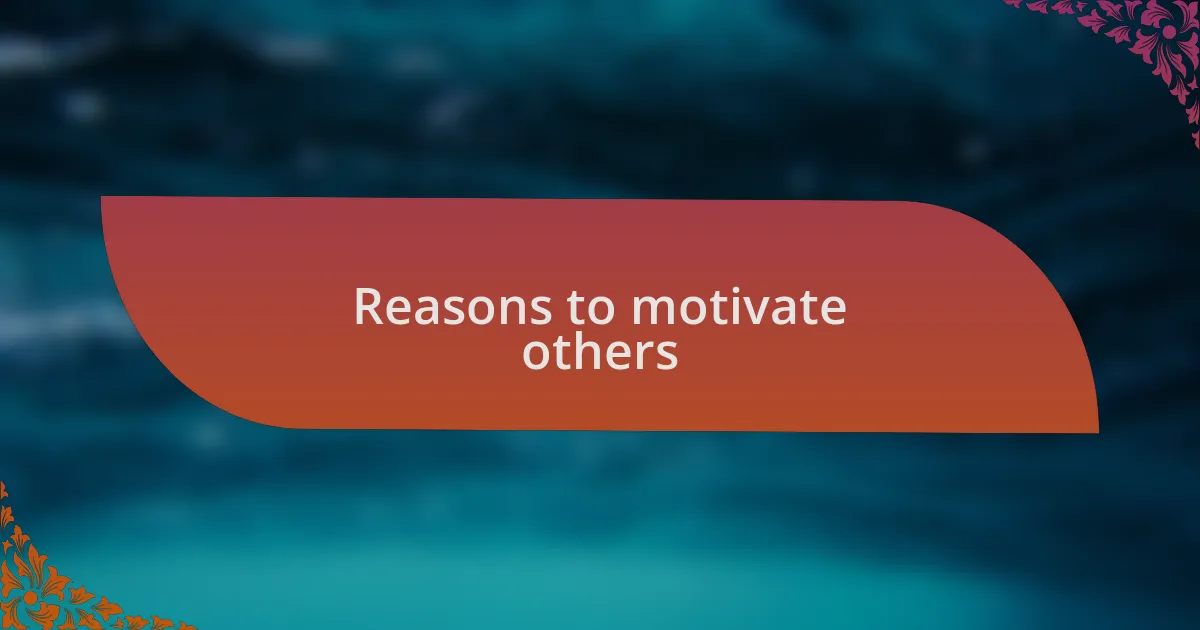
Reasons to motivate others
One powerful reason to motivate others is the shared responsibility we have towards our planet. In my own life, I’ve felt a surge of joy when I’ve inspired a friend to swap single-use plastics for reusable alternatives. It’s incredible how one small change can ignite a desire for more sustainable living. Have you ever experienced that moment when someone realizes they can make a difference? It’s as if a light bulb switches on, revealing the endless possibilities of collective action.
Moreover, motivation fosters community and connection. I recall organizing a beach cleanup where I met like-minded individuals who were just as passionate about the ocean. We not only left the beach cleaner, but we also bonded over our shared beliefs. It struck me that when we unite for a cause, we amplify our impact. Don’t you think collective efforts inspire others to join in? It’s contagious; the momentum builds, creating a ripple effect.
Finally, by motivating others, we not only contribute to ocean conservation but also nurture their sense of purpose. I’ve seen friends transform from casual beachgoers to passionate conservation advocates after understanding the threats facing marine life. It’s fulfilling to witness their growth. Isn’t it rewarding to be part of someone’s journey toward making better choices? Together, we can cultivate a culture of stewardship and appreciation for our oceans.
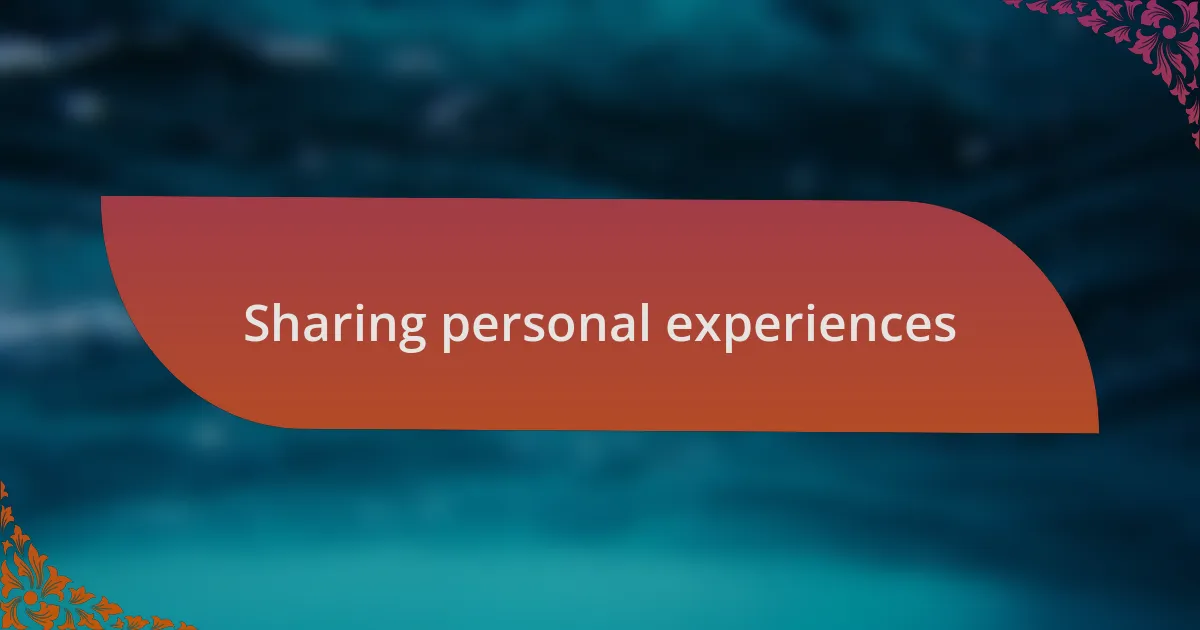
Sharing personal experiences
When I began my own journey towards a greener lifestyle, I reached out to my family, sharing my experiences with composting and reducing food waste. Initially met with skepticism, I soon found joy in showing them the simple yet impactful changes I made at home. Their surprise and eventual willingness to replicate my efforts made me realize the power of sharing personal stories. Have you ever noticed how relatable experiences can break down barriers?
One memorable moment occurred when I shared my journey of switching to a plant-based diet. I remember the hesitation in my friend’s eyes as I described how vibrant my meals had become, bursting with both flavor and health benefits. After joining me for a week of plant-based dinners, she opened up about feeling more energized and even mentioned trying more recipes on her own. It’s remarkable how sharing a piece of my life could spark that curiosity in her. Have you seen how sharing your journey can inspire others to explore new paths?
Encouraging dialogue around our experiences is also crucial. During a casual chat with coworkers, I recounted my eye-opening visit to an ocean conservation group. Their stories of marine life struggles and resilience struck a chord, prompting a conversation on how we could cut down on our plastic usage at work. I could see the shift in their perspectives as they began pondering their own habits. Isn’t it inspiring when authentic conversations lead to collective initiatives?
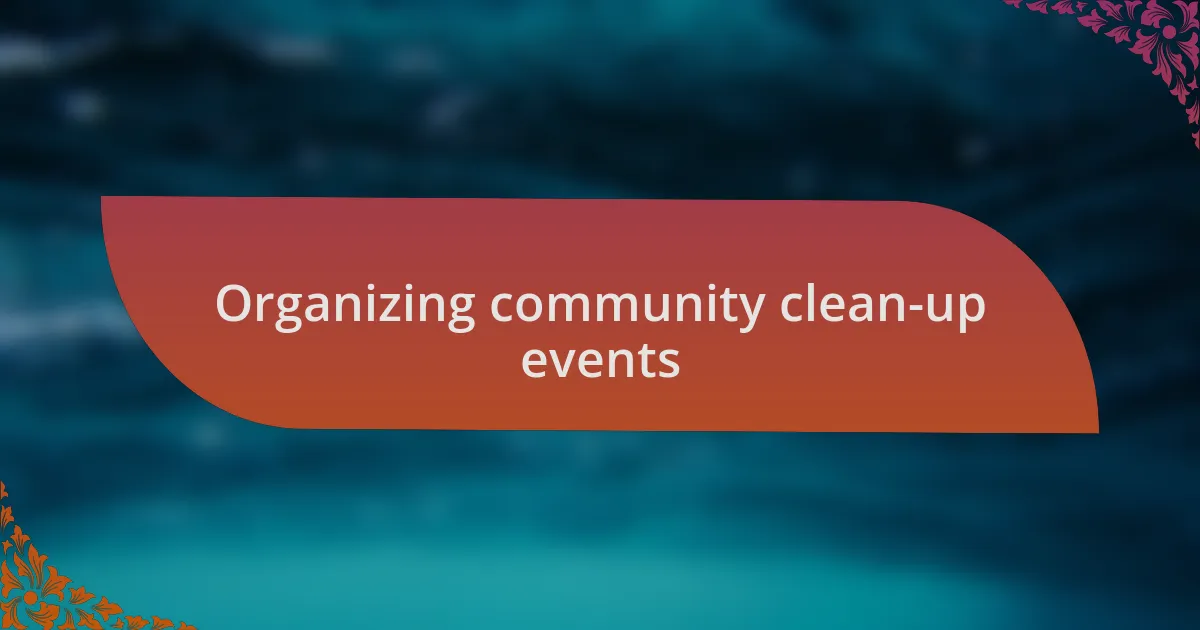
Organizing community clean-up events
When I decided to organize a community clean-up event, my goal was simple: foster a sense of collective responsibility for our local beaches. I remember standing in front of a small group, sharing my passion for a cleaner ocean, and urging them to envision a shoreline free from plastic waste. I could see their eyes light up with excitement—who doesn’t want to be part of something bigger than themselves?
As we gathered on the designated day, the energy was palpable. I witnessed families bonding over trash bags and fellow community members exchanging camaraderie while picking up litter. One mother even shared how her children were inspired to create artwork from what we collected, turning trash into treasure. These moments made me realize that clean-ups aren’t just about picking up debris—they’re about building connections and fostering a sense of pride in our shared spaces, don’t you think?
In reflecting on the event afterwards, I could sense a shift in our community’s mindset. The conversations flowed as we discussed ideas for continued stewardship of our beaches. Encouraging people to bring friends next time turned out to be a natural step, as I saw how meaningful it was to involve more voices in the conversation. Doesn’t it feel empowering to know that small actions can lead to lasting change?
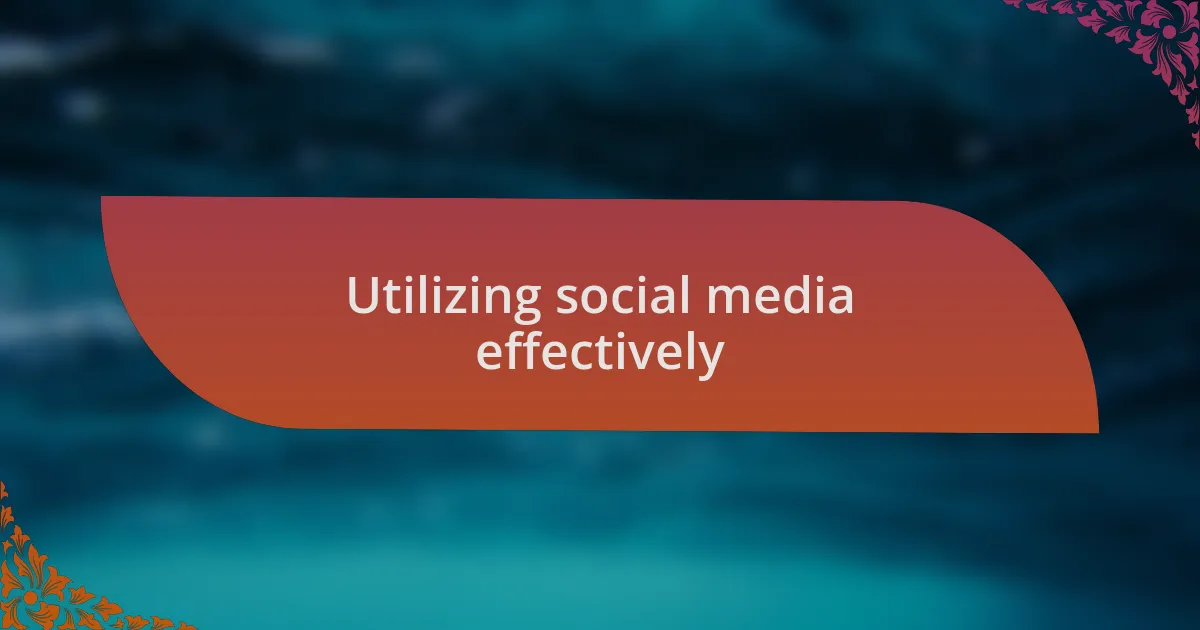
Utilizing social media effectively
Harnessing the power of social media has been a game-changer for my efforts to promote green initiatives. On days when I felt a bit overwhelmed, I would post engaging graphics of ocean life affected by pollution alongside calls to action. The comments and shares from friends and followers made me realize just how deeply we can connect with like-minded individuals online. Have you noticed how a single post can ripple through your network, sparking conversations about conservation?
One memorable experience was when I shared photos from a recent beach cleanup on Instagram. The impact was immediate; my followers began tagging their friends and planning their own cleanups. That collective enthusiasm illustrated how social media can transform individual passions into community movements. It’s incredible to witness how a simple message can inspire others to join in and take action, isn’t it?
As I’ve continued to utilize social media platforms, I’ve learned that storytelling is key. I now share personal stories about my journey in conservation, revealing both the challenges and triumphs along the way. This transparency resonates with people, often leading to deeper discussions about how we can work together for our oceans. I’ve found that authenticity invites others to share their experiences too, creating an interactive community of change-makers. What story can you share to inspire others to hop on this green journey with you?
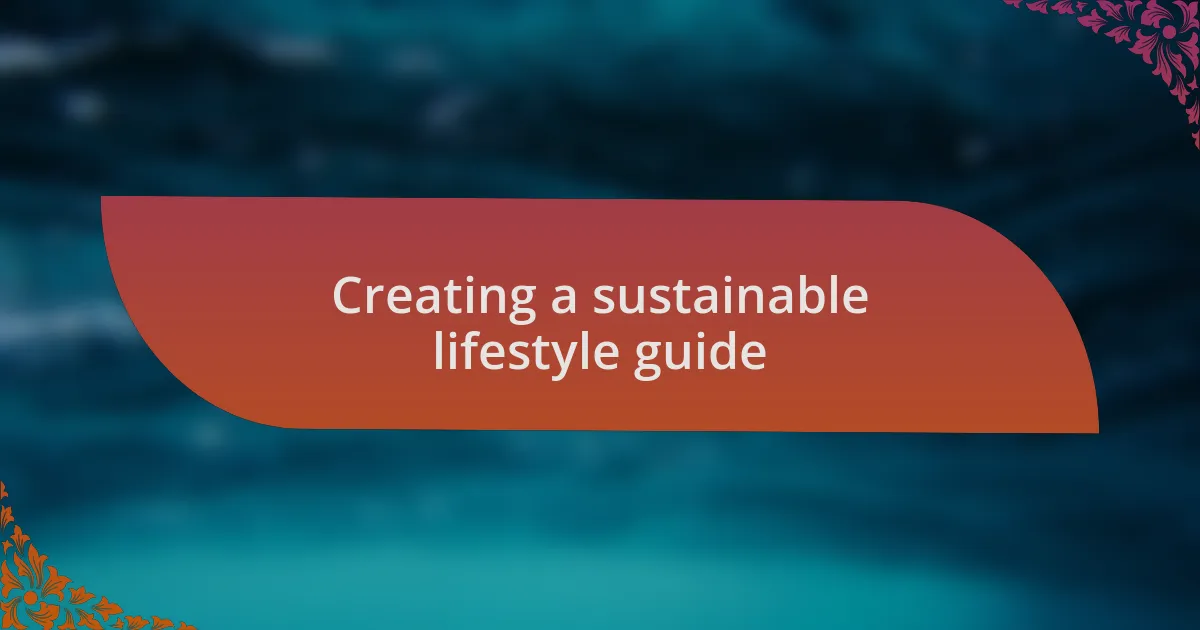
Creating a sustainable lifestyle guide
Creating a sustainable lifestyle guide starts with understanding the small changes you can implement in daily routines. For example, I once switched to reusable shopping bags, and I was surprised at how easy it was. This simple decision not only reduced my plastic use but also sparked conversations with checkout clerks and fellow shoppers about sustainable choices. Have you considered what small actions might inspire those around you?
As I compiled my guide, I focused on practical tips that anyone can adopt—like composting kitchen scraps or opting for plant-based meals a few times a week. I remember hosting a potluck dinner where each dish was not only delicious but also showcased local, seasonal ingredients. The positive energy and excitement from my friends opened their eyes to how enjoyable sustainable eating can be. How often do we underestimate the power of food to serve as a catalyst for change?
I realized that having a clear, engaging layout for the guide was essential. By sharing my journey through a mix of charts, personal anecdotes, and visually appealing images, I’ve made the concept of sustainability more accessible. It’s fascinating to see how many people feel empowered once they understand the tangible impact of their choices. Are you ready to document your path toward sustainability and inspire others along the way?